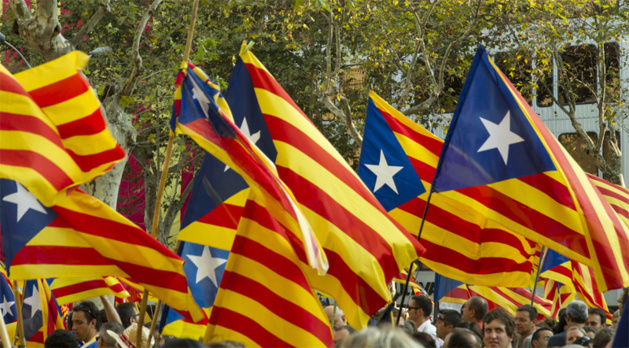
Photo : Claudi Cervelló on Flickr
This new event, which may seem insignificant, caused a stir in Spain given the ongoing tension between the central government of Spain and the regional government of Catalonia. Madrid sees this as a renewed offensive from Mas and the Catalan population as the regional government of Catalonia has kept on asking for a referendum on independence, and has launched several operations aimed at setting the stage for the possible establishment of a sovereign, independent state.
Artur Mas is downplaying this event and justifies himself arguing that this new agreement has nothing to do with the independence process. He even goes further claiming that the agreement is not enough and that if Catalonia had the same status as Quebec, UNESCO would have accepted a standing delegation for Catalonia.
In the wings of this event at UNESCO, Artur Mas had also planned to meet with the French Minister of Defense, Jean-Yves Le Drian, in the afternoon. The Minister eventually canceled the meeting due to a “busy schedule”. Catalans denounced pressure from Madrid on the Minister. This unofficial meeting certainly did not please the Spanish government. The Spanish Foreign Minister declared that “playing alone rarely produces good results” when talking about the Catalan president. According to him, the president would have better used the official channels to avoid a last minute cancellation. The tone is set.
Artur Mas is downplaying this event and justifies himself arguing that this new agreement has nothing to do with the independence process. He even goes further claiming that the agreement is not enough and that if Catalonia had the same status as Quebec, UNESCO would have accepted a standing delegation for Catalonia.
In the wings of this event at UNESCO, Artur Mas had also planned to meet with the French Minister of Defense, Jean-Yves Le Drian, in the afternoon. The Minister eventually canceled the meeting due to a “busy schedule”. Catalans denounced pressure from Madrid on the Minister. This unofficial meeting certainly did not please the Spanish government. The Spanish Foreign Minister declared that “playing alone rarely produces good results” when talking about the Catalan president. According to him, the president would have better used the official channels to avoid a last minute cancellation. The tone is set.
MADRID TRIES TO RESUME CONTROL
It is not the first time that Madrid and Barcelona clash on this issue. In theory, foreign policy is a power held by the Spanish government and not devolved to autonomous communities. But in fact, direct relationships between foreign countries and regions, whether they are economic or cultural, are not rare. Indeed, economic requirements as well as the current situation in Europe urge regions to build up relationships with foreign countries. There are a wide range of representative offices of regional governments abroad. The new right wing government has questioned these representative offices claiming that they are a way to by-pass official channels. It may be the ambiguity of the regional foreign policy between economic requirements and political aims that fuels the debate.
The Spanish government drafted a law in February 2012 to limit the foreign policy activities of regional governments. The draft law, which is still under discussion, provides that the heads of regional governments should inform the Foreign Ministry of the actions they intend to take abroad in order to determine whether they are in line with the central government’s policy objectives. In this context, the Catalan government approved a project for the development of a network of representative offices of Catalonia abroad. Artur Mas has been travelling to present his referendum project on the independence of Catalonia in front of the European institutions. The struggle for independence is also playing out abroad and has only just begun.
The Spanish government drafted a law in February 2012 to limit the foreign policy activities of regional governments. The draft law, which is still under discussion, provides that the heads of regional governments should inform the Foreign Ministry of the actions they intend to take abroad in order to determine whether they are in line with the central government’s policy objectives. In this context, the Catalan government approved a project for the development of a network of representative offices of Catalonia abroad. Artur Mas has been travelling to present his referendum project on the independence of Catalonia in front of the European institutions. The struggle for independence is also playing out abroad and has only just begun.



























